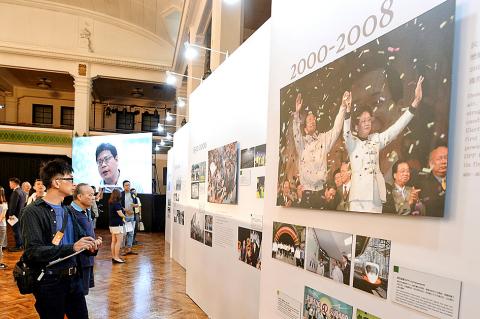Several Democratic Progressive Party (DPP) members said a discussion about the party’s core values is necessary as they called for a rescheduling of events marking the 30th anniversary of the DPP’s founding that were to take place at the Grand Hotel in Taipei on Wednesday, but were canceled due to Typhoon Megi.
On Sept. 28, 1986, 132 people took an oath at the Grand Hotel to found the DPP at a time when Taiwan was still under martial law and the establishment of new political parties was not allowed.
The DPP planned to hold an expanded meeting of its Central Standing Committee at the hotel, inviting all 18 members of the organizing committee to a reunion.

Photo: Lin Cheng-kun, Taipei Times
Hsu Jung-shu (許榮淑), one of the 18 who founded the party, on Wednesday said the DPP should consider the interests of Taiwanese and adopt a clear and definite cross-strait policy to avoid reacting passively to Beijing’s moves.
Hsu said the DPP “is no longer a rookie” and should “make contributions to Taiwanese,” as the party has won the reins of government for a second time and holds a legislative majority for the first time.
Although Taiwan has grown over the past three decades into a liberal democracy, the issue of national identity remains a point that has split the nation in a “unification versus independence” debate, Hsu said.

Photo: Lin Cheng-kun, Taipei Times
A captain “is obliged to inform her passengers where the ship is heading,” she said.
Some people envision Taiwan as an independent nation that does not bear the official name the Republic of China (ROC) and is not governed based on the 1947 Constitution, while those advocating “unification” see union with Beijing as a new entity — however that is defined, Hsu said, adding that the issue of unification versus independence should be discussed by all groups in the spirit of democracy, in the same way that the DPP debated its China policy in 1998 when Hsu Hsin-liang (許信良) was its chairman.
Hsu Jung-shu said that in 2008, she expected that the DPP would draft a cross-strait policy that was not as reliant on Beijing as the Chinese Nationalist Party’s (KMT) version, but at the same time would take care of the interests of Taiwanese.
She was expelled by the DPP in 2009 after she visited China in defiance of party policy and later founded the People Priority Party.
Former DPP legislator Lin Cho-shui (林濁水) said the DPP was the trailblazer of Taiwan’s major issues, ranging from independence, cultural autonomy, direct elections for the presidency and the “comprehensive electoral reform of the people’s representatives.”
“Comprehensive re-election of the people’s representatives” is a term referring to the general re-election of National Assembly members in 1991 and Legislative Yuan members in 1992, when members stepped down after being elected in areas formerly controlled by the ROC that became People’s Republic of China territory.
Lin said that the DPP did not realign itself with the agendas of social activists in 2013 and 2014, a failure that led to its “gradual marginalization, loss of direction, loss of core values and an inability to grasp current affairs or develop a vision for the future.”
“In spite of a majority support for changes to the Constitution, the DPP avoided the issue,” he said. “Is this entity still called the DPP? I find it unrecognizable.”
“There are those within the party who would sacrifice Taiwanese identity and consciousness to ingratiate themselves with China,” former national policy adviser and longtime DPP supporter Wu Li-pei (吳澧培) said. “I cannot abide that. Do not presume to think that the DPP is indispensable to Taiwan; if the DPP does not lead Taiwanese on the right path, political parties that are able and willing to defend Taiwan will rise and replace the DPP.”
Meanwhile, DPP spokesperson Ruan Jhao-hsyung (阮昭雄) said the issue of rescheduling anniversary events “needs internal discussion.”

The Mainland Affairs Council (MAC) today condemned the Chinese Communist Party (CCP) after the Czech officials confirmed that Chinese agents had surveilled Vice President Hsiao Bi-khim (蕭美琴) during her visit to Prague in March last year. Czech Military Intelligence director Petr Bartovsky yesterday said that Chinese operatives had attempted to create the conditions to carry out a demonstrative incident involving Hsiao, going as far as to plan a collision with her car. Hsiao was vice president-elect at the time. The MAC said that it has requested an explanation and demanded a public apology from Beijing. The CCP has repeatedly ignored the desires

Many Chinese spouses required to submit proof of having renounced their Chinese household registration have either completed the process or provided affidavits ahead of the June 30 deadline, the Mainland Affairs Council (MAC) said on Thursday. Of the 12,146 people required to submit the proof, 5,534 had done so as of Wednesday, MAC deputy head and spokesperson Liang Wen-chieh (梁文傑) said. Another 2,572 people who met conditions for exemption or deferral from submitting proof of deregistration — such as those with serious illnesses or injuries — have submitted affidavits instead, he said. “As long as individuals are willing to cooperate with the legal

The Ma-anshan Nuclear Power Plant’s license has expired and it cannot simply be restarted, the Executive Yuan said today, ahead of national debates on the nuclear power referendum. The No. 2 reactor at the Ma-anshan Nuclear Power Plant in Pingtung County was disconnected from the nation’s power grid and completely shut down on May 17, the day its license expired. The government would prioritize people’s safety and conduct necessary evaluations and checks if there is a need to extend the service life of the reactor, Executive Yuan spokeswoman Michelle Lee (李慧芝) told a news conference. Lee said that the referendum would read: “Do

Taiwan's Vice President Hsiao Bi-khim (蕭美琴) said Saturday that she would not be intimidated by the Chinese Communist Party (CCP), following reports that Chinese agents planned to ram her car during a visit to the Czech Republic last year. "I had a great visit to Prague & thank the Czech authorities for their hospitality & ensuring my safety," Hsiao said on social media platform X. "The CCP's unlawful activities will NOT intimidate me from voicing Taiwan's interests in the international community," she wrote. Hsiao visited the Czech Republic on March 18 last year as vice president-elect and met with Czech Senate leadership, including